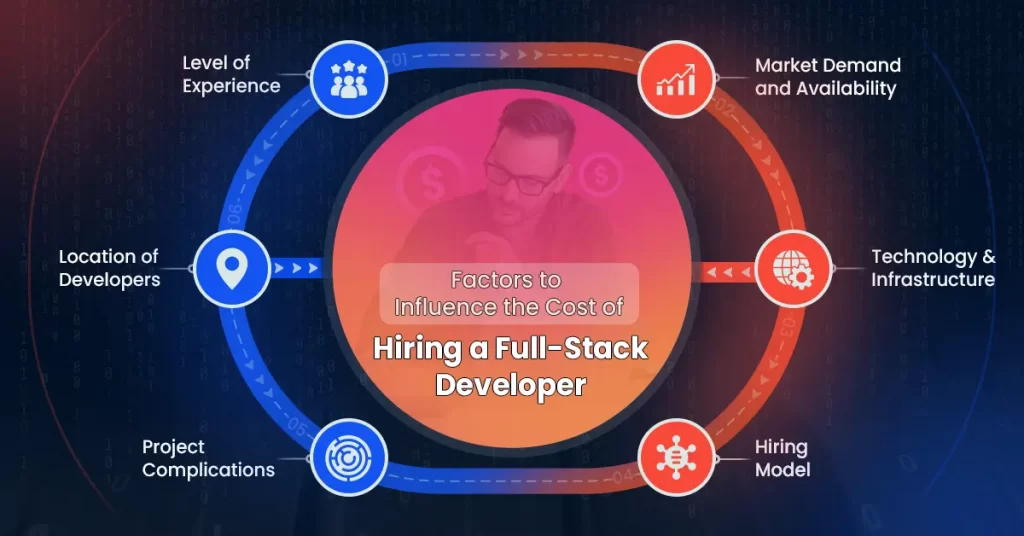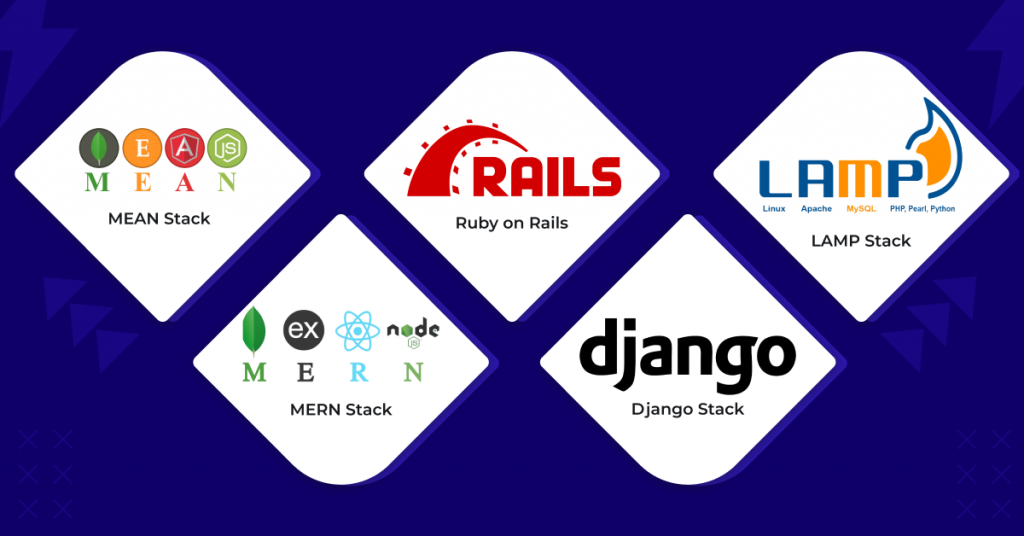How Much Does It Cost to Hire a Full Stack Developer?

Is your business struggling to scale due to tech limitations?
What if a few expert hires could streamline your entire development process?
Want to know the exact process and cost of hiring a full stack developer to develop your business?
Straight to the point: Hiring full stack developers can transform your business by streamlining operations and driving growth. Their expertise in both front-end and back-end developments enables:
- Seamless integrations of user interfaces,
- Can get robust server side functionalities
- Enhances the UX and operational efficiency.
Stating the stats, the demand for software developers is expected to grow by 22% in the coming years, and this underscores their critical roles in building modern biz.
And by leveraging their skillets, many companies like Google, Amazon, IBM, Microsoft, and more hired full stack developers to reduce costs associated with hiring multiple specialists and accelerated project timelines.
So, hiring a full stack developer is a sure shot win for businesses looking to enhance their web and mobile apps.
This article explores the cost of hiring full stack developers, key instances that affect the hiring costs, helping business plan their budget and make informed decisions.
Table of Contents
What is the Cost of Hiring a Full Stack Developer?
The cost to hire a full stack developer depends on various factors like work experience, location, project complexity, hiring model, and app infrastructure. In the United States, the rates are from $80 to $160 per hour, whereas developers from Eastern Europe or India charge between $30 to $90 per hour.
And full time salaries could vary anywhere from $80,000 and $140,000 annually. For scaling the business to reach milestones, hiring flexibility matters as dedicated Full Stack Developers:
- Streamline frontend, backend, and DevOps
- Handling Kubernetes orchestrations, CI/CD pipelines,
- Cloud automation and microservices.

On the other hand, onboarding freelance full stack developers may suit best for short team needs, but could lack enterprise-level security compliance. But pre-vetted developers ensure faster deployment and optimized application performance.
Choosing an experienced Full Stack Developer means more value in API integrations, scalable architectures, and superb security that are crucial for high growth brands looking to expand their offerings.
Breakdown of the cost to hire full stack developer by region & engagement type:
| Hiring Model | Cost Range | Considerations |
|---|---|---|
| Hourly Rates | 1. US: $80 – $160/hr 2. EU/India: $30 – $90/hr | 1. Higher cost due to location and demand. 2. More cost-effective options. |
| Full-Time Salaries | $80,000 – $140,000/yr | The annual cost for dedicated in-house developers. |
| Dedicated Teams | Depends on Team Size | Streamlines full-stack development, DevOps, and cloud automation. |
| Freelance | $60 – $90 per hour on average | Suitable for short-term, but may lack enterprise-level security. |
| Experience | $80 – $150/hr (Varies on Skillset) | Enables better APIs, scalability, and security for growth |
Factors to Influence the Cost of Hiring a Full-Stack Developer
Hiring a full stack developer is a win-win and critical investment for brands who are looking to build scalable digital products and solutions. However, the cost can differ based on various factors affecting the process.
Understanding these factors and technology stack can help ascertain the cost to hire full stack developers effectively while ensuring you pick the right talent for your biz.
Below, we list out some key combinations that determine the demand of full stack developer costs along w/ technical insights.

1. Level of Experience
A developer’s expertise significantly impacts the cost of hiring a full stack developer. So, they are usually categorized into multiple experience levels like:
- Junior Full Stack Developers [1 -3 years]: $20,000 – $ 60,000 per year (or) $20 – $50 per hour. They are proficient in frameworksLocation & Hourly Rate of Full Stack Developers of basic frontend and backend deployment by requiring supervision for superior results.
- Mid Level Full Stack Developers [3 – 6 years of experience]: $60,000 – $100,00 per year (or) $50 – $100 per hour. They come w/ prior experience in programming languages, handling servers, APIs, and database management and don’t need much supervision.
- Senior Full Stack Developers [6+ years of experience]: $100,000 – $200,000 per year (or) $80 – $150 per hour. They experience level and specialization in implementations of complex architectures, performance optimizations, and strategies tech decisions.
- Lead Full Stack Developers [10+ years of experience]: $200,000 – $300,000+ per year (or) $200 – $300+ per hour. They are experts in driving large-scale technical projects, setting architectural standards, and mentoring teams.
Here is the average cost to hire full-stack developers based on experience level:
| Experience | Average Cost (USD) | Descriptions |
|---|---|---|
| Junior (1-3 Years) | $20 – $50/hr | Basic skills, requires supervision. |
| Mid-Level (3-6 Years) | $50 – $100/hr | Proficient, less supervision needed. |
| Senior (6+ Years) | $80 – $150/hr | Expert, complex projects. |
| Lead (10+ Years) | $200-300/hr or more | System architecture, team lead |
2. Location of Developers
The cost of a full-stack developer is usually around $25 – $100. However, the location of developers should be considered and taken into account, as the region where the full-stack developers live affects the hourly rate they charge due to global cost of living differences.
- North America [USA, Canada]: $80 – $150 per hour
- Western Europe [UK, Germany, France]: $50 – $120 per hour
- Eastern Europe [Poland, Ukraine, Romanian]: $30 – $70 per hour
- Asia [India, Vietnam, Philippines]: $20 – $50 per hour
- South America [Brazil, Argentina]: $30 – $60 per hour
These location-based costs can help you plan your budget more effectively:
| Location | Cost Range (USD) | Additional Expenses |
|---|---|---|
| Asia | $20 – $50 per hour | Cost-effective, fewer benefits |
| North America | $80 – $150 per hour | Higher living costs, extensive benefits |
| Western Europe | $50 – $120 per hour | Higher living costs, good |
| Eastern Europe | $30 – $70 per hour | Lower living costs, few benefits |
| South America | $30 – $60 per hour | Moderate living costs, some benefits |
3. Project Complications
The complexity of the projects and the system architecture determines the number of roles needed and effort required, and thus the cost differences for hiring full stack developers.
- Basic Websites or MVPs: $5,000 – $12,000
- Mid Size Apps [eCommerce, SaaS]: $20,000 – $100,000
- Enterprise [AI, FinTech]: $100,000 – $500,000+
When it comes to complex applications, the team may require expertise in API development, database optimization, security protocols, cloud integration and more – all of which have a role to play in wage differences and increasing the development cost.
Here is the average cost to hire full-stack developers based on project complexity, duration, and team size:
| Project Complexity | Cost Range (USD) | Notes |
|---|---|---|
| Basic/MVP | $5,000 – $12,000 | Simple websites |
| Mid-Size Apps | $20,000 – $100,000 | eCommerce, SaaS applications |
| Enterprise/Specialized | $100,000+ | AI, complex systems. |
4. Hiring Model
The engagement mode you choose directly affects the cost of hiring a full stack developer, and this is how:
- Full Time and In-House: $80,000 – $100,00 annually, suitable for businesses with consistency that require long term projects.
- Freelance or Contract Based: Could be either $30 – $150 per hour. And this works best for short term projects or custom tasks.
- Project-Based Hiring: Falls in between $10,000 – $100,000. Best fit for businesses outsourcing specific projects and development needs.
- Dedicated Teams: $5,000 – $20,000 per month. This allows brands to scale their workflow with more flexibility and faith.
Here are the cost comparison by hiring model for full stack developers:
| Hiring Model | Cost Range (USD) | Notes |
|---|---|---|
| Full-Time/In-House | $80,000 – $100,000/Year | Long-term, consistent work. |
| Freelance | $30 – $150 per hour | Short-term, specific tasks. |
| Project-Based | $10,000 – $100,000 per project | Outsourcing projects and development needs |
| Dedicated Teams | $5,000 – $20,000 per month | Flexible, scalable development support |
5. Technology and Infrastructure
Deciding what technology and architecture to go ahead with influences both the availability and hourly rate for full stack developers. More insights below.
- JavaScript [MERN/MEAN Stack]: $30 – $80 per hour
- Python, Django or Ruby on Rails: $50 – $120 per hour
- Special Frameworks [Next.js | Nest.js]: $70 – $150 per hour
- Cloud Based like AWS, Azure, etc: $80 – $200 per hour
Here is the cost breakdowns by tech stack and architecture:
| Technology | Cost Range (USD) | Notes |
|---|---|---|
| Common Stacks (JavaScript) | $30 – $80/hr | Widely available developers. |
| Specialized/Cloud | $80 – $200/hr | Niche skills, high demand. |
| Python, Django, or Ruby on Rails | $50 – $120 | Great for scalable backend systems. |
| Special Frameworks (Next.js, Nest.js) | $70 – $150 | Ideal for high-performance custom apps. |
6. Market Demand and Availability
Full stack developers who are proficient in high demand tech and expertise could command for more pay than the usual standard. Here are some examples:
- React, Node, Vue Developers: High demand, averaging $100 per hour
- Blockchain and AI Developers: $100 – $200 per/hour due to niche expertise
- WordPress and PHP Developers: $20 – $50 per hour on as demand is low
Talking about stats too, the average salary for a full stack developer in the US is approximately $120,000 per year, according to feedback from Glassdoor:
- Entry level positions starting at $100,00
- And experienced earning up to $160,000
To conclude, multiple factors play a role behind the cost of hiring a full stack developer. Whether you are a lean startup building an MVP or a large enterprise on the verge of scaling operations, understanding these factors will help you in choosing the right developer while cutting down unnecessary costs.
Investing in the right people and expertise ensures not only faster development of your vision, but comes w/ long term scalability and performance that’ll stand the test of time.
Cost of Hiring Full Stack Developers Based on Tech Stack

Below is a breakdown of the cost for popular full-stack combinations, which can also inform decisions for full stack mobile app development projects requiring web backend integration, as well as traditional web applications:
- MEAN/MERN Stack — These developers are in high demand due to the popularity of JavaScript frameworks. The hourly rate of a full stack developer or MERN stack developers or MEAN stack developers charges between $50 to $120.
- LAMP Stack — A more traditional stack, often used for web applications. The hourly rate full stack developer for LAMP stack is generally $30 to $100, depending on experience.
- Python-Django — Full-stack developers specializing in Python and Django usually command rates from $40 to $130 per hour, thanks to the versatility and demand of Python in both web and AI development.
- Ruby on Rails — Ruby developers tend to charge $50 to $150 per hour due to the scarcity of talent and the framework’s efficiency for quick application development.
Well, hiring full stack developers is more than just about costs, it’s about the expertise they bring in, the scalability factors, and the scope for long term growth. As the right tech stack impacts:
- Project Speed
- Optimal performance
- And overall expenses incurred
Businesses should align hiring decisions with their scalability goals when they fix the cost to hire full stack developers to ensure they get maximum value from the investment and energy they are putting into.
How to Save Costs of Hiring Full Stack Developers?
To save your costs while hiring full stack developers without making any compromises on quality of work and expertise, you can follow these hiring strategies that have been tried and tested by top global brands across the world.

- Opt for Dedicated Teams: This works the best, all the time! Instead of full time hires that increase your overall cost of hiring a full stack developer, collaborate w/ managed teams to scale projects with ease and flex.
- Leverage Pre-Vetted Options: Companies like CONTUS Tech and platforms like Toptal provide rigorously tested developers that reduce hiring team and give you top tier talent without recruitment overhead.
- Hybrid Hiring Models: Blend in-house teams for core functions and remote developers for hire, on-demand tasks, cutting fixed salary costs.
What are the Key Considerations for Hiring Full Stack Developers?

➡️ Ensure the full stack developers master frontend, backend, APIs, database and DevOps for seamless development and scalable architectures.
➡️ Cost of hiring a full stack developer and how much budget you allot must be planned in advance as there are multiple tiers in pay scale.
➡️ Better to go for developers skilled in microservices, cloud deployment, and CI/CD pipeline to get long-term scalability and reliability.
➡️ Important: Choose developers based on your project needs. For example, MERN for web apps, Django for AI, and .NET for enterprise applications.
➡️ A strong understanding of encryption, authentication protocols, and secure coding practices can ensure world-class protection of what you build.
➡️ Also, look for prior expertise in caching, database indexing, and server load balancing to improve performance, speed, and efficiency.
➡️ Hiring a full stack developer who’s familiar w/ containerization [Docker, Kubernetes, etc.] and automated deployment can help streamline workflows.
➡️The developer should understand your vision and business dreams to ensure their solutions support your business expansions and scales – with ease.
Wrapping Up
Hiring the right full stack developer can make or break your success chances!
Now that you gained more insights on cost to hire full stack developers and the top companies for hiring full stack developers from – You need to take the next step.
With CONTUS Tech, you don’t have to wait for 2 months as you can get access to full stack developers in just 48 hours (or even less) – Geared up with the tech and tools to build high-performance, scalable applications for mobile & web.
No hiring delays, no overhead costs. All you get is development that saves you 60% on costs while delivering enterprise grade solutions. With
- Over 300 senior full stack developers
- And 95% client satisfaction rate,
You could not just be hiring talents from CONTUS Tech, you are investing in business growth. And if you are still unsure – Try a 15-day risk-free trial time and experience the impact firsthand.
Your next big breakthrough starts with the right team, and CONTUS Tech has built digital products and solutions that generated millions of dollars. You could be the next.
Let’s build something game-changing – fast, efficiency, and fit for the future!
Reach out to us to hire experienced, time zone-matched full stack developers within the next 48 hours. Our amazing sales team is operating across major time zones and are ready to assist you.
Frequently Asked Questions:
How much does it cost to hire a programmer?
The cost of hiring software developers varies based on their expertise and experience. You’ll find entry-level coders charging around $30-50 hourly, while seasoned engineers ask for $80-140 per hour. Mid-level programmers typically fall in the $50-80 range. Remember, these rates often reflect the developer’s skill set, project complexity, and location.
What are the benefits of hiring Full-Stack Developers?
Full-stack developers are the ultimate one-person army for your tech projects. They’ll handle both front-end and back-end development, saving you money on hiring multiple specialists. Plus, they’re incredibly adaptable and can jump in wherever needed, making your development process smoother and faster.
How much does it cost to hire software developers across various regions?
Software developer costs vary dramatically by region. North American developers typically charge $100-150/hr, while Western European rates range from $70-100/hr. You’ll find more budget-friendly options in Eastern Europe ($40-70/hr) and Asia ($25-50/hr).
How do you hire Full-Stack developers for your project?
Start by clearly defining your project requirements and tech stack needs. Then, evaluate candidates based on their portfolio, hands-on coding tests, and experience with relevant technologies. You can find talented developers through tech job boards, freelance platforms, or by partnering with full-stack development company.
How can we reduce the cost of hiring MERN stack developers?
Cut costs without compromising quality by considering offshore development teams from regions with lower rates. Look into hiring junior developers for simpler tasks while having a senior developer oversee the work. You might also want to explore hiring on a project basis rather than full-time, or per-hour basics based on the requirements





Great blog!!! Its a super helpful content if you’re thinking about hiring a full stack application developer. It breaks down all the costs involved so you know what to expect. Really saved me some headache!
I had no idea about the differences between hiring a dedicated full stack flutter developer and a freelancer developer until I read this blog. Now I see why having a dedicated person can be worth the extra cost in the long run.
I’m glad the blog helped! A dedicated flutter developer offers consistency and a deeper project understanding, making them a great long-term investment despite the higher cost.
I’m so glad this blog talked about negotiating with full stack web app developers. It’s something I’ve been nervous about, but now I feel more confident going into those conversations.
Hi Tyler
Glad to hear the blog boosted your confidence!
The case studies were a nice touch. Seeing how other businesses benefited from hiring full stack laravel developer helped me understand the real value they bring to a project.
I’m in the middle of hiring azure full stack developer, and you gave me a clear idea of what to consider through this blog. Loved how they explained different pricing options and how to negotiate. Super practical!
Hi Reece,
Glad to hear the blog was helpful! Good luck with your hiring process!
The cost-benefit analysis section was super helpful. It made me think about the bigger picture and how hiring a full stack mobile app developer could impact my project in the long term.
Great breakdown of hiring costs for full stack developers! Very informative.
The detailed cost analysis in this blog is exactly what I needed. Great job!
Excellent breakdown of regional cost differences! It’s crucial to consider these variations when planning our budget for hiring a developer.
Absolutely! Understanding regional cost differences can make a significant impact on budget planning. It’s great that the blog covered this aspect so thoroughly.
This article clarified a lot of my doubts about full stack development costs. The insights on long-term investment versus short-term savings are especially valuable.
Glad to hear the article helped clear up your doubts! It’s great that the long-term vs. short-term insights were useful. Thanks for sharing your feedback!
I appreciate the detailed explanation of skill levels and how they impact costs. It’s helpful to know what to expect when hiring junior vs senior developers.
full stack wordpress developer seems cost-effective. You get a lot of value from someone who can work on all aspects of a project.
Absolutely right Logan! Hiring wordpress developers in full stack is a smart choice. They offer great value by handling both front-end and back-end tasks, streamlining your project and cutting costs.
I didn’t realize the salary range for react developers was so varied depending on location. It really shows how much geography can impact hiring costs.
It’s surprising how location can shift salary ranges for full stack react developer. It highlights just how geography plays a big role in hiring costs, making it crucial to consider regional differences when budgeting for your development team.
Experience levels definitely impact hiring costs. It’s good to know what to expect when budgeting for a full stack javascript developer.
Seeing the cost differences across countries is enlightening. Outsourcing could be a viable option for cost-effective full stack development.
Considering the high demand, it’s clear why full stack php developer are so essential. Their adaptability and efficiency are unmatched.
How does location impact the cost of hiring a remote stack developer?
Developer rates vary by location; those in high-cost areas command higher salaries compared to developers in regions with lower costs of living, affecting overall hiring costs.
How does hiring a python full stack developer save on costs compared to hiring separate front-end developers and back-end developers?
Hiring a python developer is cost-effective since they handle both front-end and back-end tasks, eliminating the need for multiple specialists and reducing overall project costs.
What is the average cost to hire a full stack developer in different countries?
The average cost to hire a fullstack developer differs globally. For instance, developers in the US and UK($70,000 to $120,000/yr) generally command higher salaries compared to other countries.
The article is more useful to me, but I would like to know if I hire a full stack software engineer is truly cost-effective in every aspect. Wouldn’t it sometimes be easy to hire specialised developers instead?
You mentioned that front end full stack developers can improve communication within a team. Can you elaborate on how they bridge gaps between front-end and back-end teams?
The blog mentioned gender pay disparity among full stack web developers. How significant is this issue, and what can companies do to address it?
It’s hard to see the salary differences by gender.
The section on comparing developers hourly rates by region is insightful. How do time zone differences affect communication and project delivery when outsourcing to countries like India or Eastern Europe?
Hi RamK
Time zones can be tricky, but overlapping work hours and tools like Slack and Zoom help. Many companies use a hybrid model to ensure constant progress, even across time zones.
The cost breakdown for devs full stack was really helpful, but it still feels tricky to budget for larger projects. How do you recommend balancing cost with quality when hiring a developer?
Great question Kenton! Focus on mid-level developers with a proven track record in projects like yours. They offer a balance of affordability and skill. For complex projects, it’s worth investing in seasoned pros.
I’m curious about the support costs you mentioned. Are these usually factored into the developer’s hourly rate, or should they be considered separately?
Support costs can be additional, especially for long-term maintenance or updates. It’s good to clarify upfront if it’s included in the hourly rate or charged separately to avoid surprises later.
Interestingly, demand for specific tech stacks influences developer rates. Is it always better to hire someone who specializes in a popular stack like MEAN/MERN for future scalability?
Popular stacks like MEAN/MERN do offer scalability and future-proofing, but it depends on your project’s needs. If the stack fits your goals, it’s worth the investment for long-term growth.
You mentioned that full-stack developers proficient in newer tech like React charge higher rates. Do you think it’s worth hiring someone more experienced in these areas for smaller projects too?
It depends on the project’s complexity. For smaller projects, a junior developer with basic React skills might suffice. But for advanced features or future scalability, investing in expertise pays off.